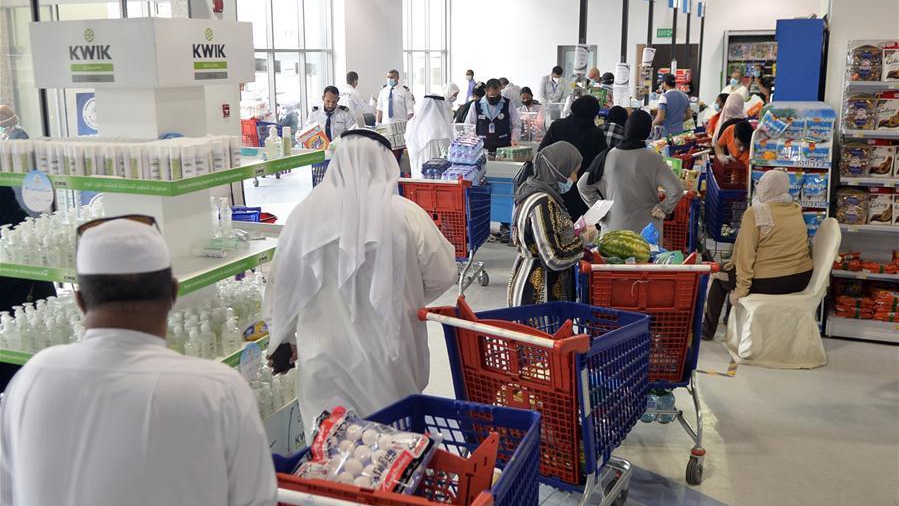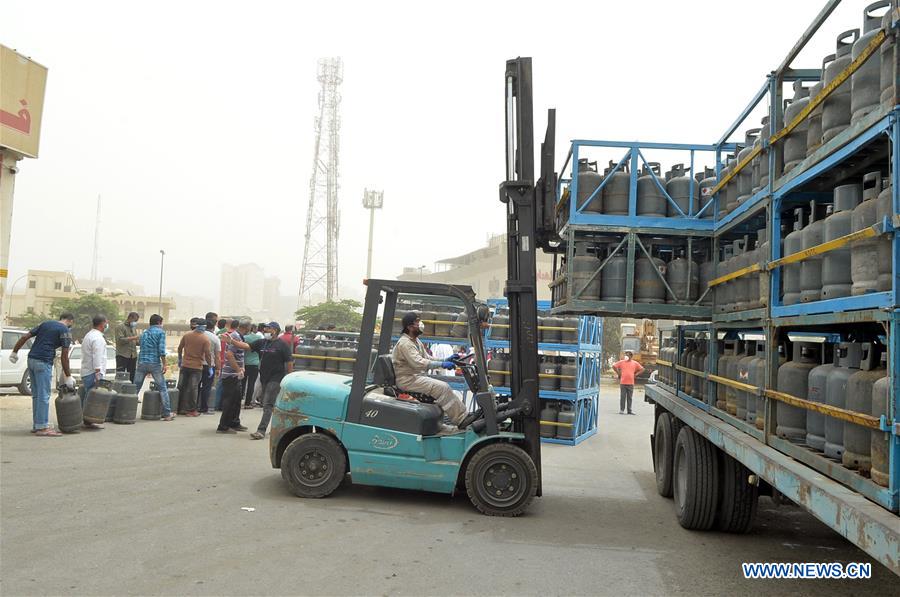
People shop at a Cooperative Society in Hawalli Governorate, Kuwait, May 9, 2020. /Xinhua
People shop at a Cooperative Society in Hawalli Governorate, Kuwait, May 9, 2020. /Xinhua
Editor's note: Guy Burton is an adjunct professor at Vesalius College, Brussels. The article reflects the author's opinions and not necessarily the views of CGTN.
Will the COVID-19 pandemic provide the basis for economic transformation in the Arab Gulf countries? Or will it be a case of a missed opportunity? There are grounds to see either happening in several of the oil monarchies in the region, but it's perhaps more likely that it will promise more than it delivers.
Since the start of the year, the spread of the coronavirus prompted governments to follow similar measures to those in other countries. Workers were told to stay at home, salaries were cut and staffing levels frozen or reduced.
The economic shutdown was global, which meant that Gulf countries – already highly dependent on the production and export of hydrocarbons – faced less demand for their oil and gas.
Despite the loss in revenue, governments found themselves as the providers of last resort and so opted for fiscal stimulus packages to help tied companies over as well as ensure welfare support for their citizens.
At the same time, these actions will be costly. The IMF predicts that the fiscal deficit for the Arab Gulf countries will fall from 2.1 percent of GDP last year to -10.4 percent this year and -8.1 percent in 2021, which may force governments to cut back on public spending in the future.
The pressure on governments to reduce public expenditure has been compounded by their reluctance to provide the same kind of food, housing and health support to the large migrant population resident in their countries.
The bulk of migrants come from South Asia, other parts of the Middle East and the Philippines. They constitute a majority of the workforce in Arab Gulf countries and mostly work for lower wages. Many of them are also confined to shared accommodation, which has contributed towards the spread of coronavirus in the region.
Unable to work and seen as a public health threat, Gulf countries have pressed their governments for their repatriation. India, Nepal and Pakistan have all been active in organizing and providing flights to the Gulf to bring back their citizens.
At the same time, Gulf governments see the current situation as a chance to change the character of their economies. Most of them have long term diversification strategies to move away from current reliance on oil and gas production and revenue and instead introduce and develop new industries and businesses. That path could be hastened both by the current state of affairs as well as fears surrounding it.
For one, the economies involved will be severely hit. The IMF believes that all countries in the region will contract this year, ranging from a 1.1 percent fall in GDP in Kuwait to 2.3 percent in Saudi Arabia and 3.5 percent in the UAE. These figures are likely to be greater than the falls in GDP growth for the region following the 2008-09 global financial crisis and the 2014-16 oil price crash.

A worker unloads gas cylinders from a truck in Hawalli Governorate, Kuwait, May 10, 2020. /Xinhua
A worker unloads gas cylinders from a truck in Hawalli Governorate, Kuwait, May 10, 2020. /Xinhua
For another, the level of business pessimism is especially pronounced. In April, 70 percent of companies surveyed by the Dubai Chamber of Commerce believed they would go out of business this year.
Given the current level of gloom then, some governments have already taken steps to press on with aspects of their diversification agenda. In the past month that has involved announcements in relation to foreign workers and spending plans.
In early May, Oman's government announced that it would take steps to reduce the number of foreigners employed in the public sector. At the beginning of June, Kuwait's Prime Minister declared that he wanted to see the proportion of foreigners fall from 70 percent to 30 percent of the workforce. Saudi Arabia, meanwhile, has reported that there will be delays and cancellations in a number of construction projects (which tend to be carried out by foreign workers), especially in the commercial and hospitality sectors.
Governments may think that now is a good time to press through such measures. In this regard, they may view the post-COVID-19 global economy in much the same way as some hard Brexiters in Britain see negotiations with the EU; if they aren't able to get a favorable trade agreement from Brussels, then it is far better to wrap up the resulting economic contraction in the wider one associated with the global health crisis.
But just as the circumstances of COVID-19 could provide the basis for economic diversification, it may also prevent it from happening. This isn't the first time that Gulf states have sought to transform their economies.
Plans to change the basis of the economy and become less dependent on oil and gas have been a constant feature of government planning since the 1970s, whether to address the finite nature of hydrocarbons or their fluctuating price and impact on national revenues.
Since then, several governments in the region have undertaken economic reforms, including expansion of infrastructure, improvements in education and health systems, the establishment of local industries and effort to encourage investment. But while this has seen growth in the non-hydrocarbon sectors of the economy, it has proved unable to break the link.
At the same time, governments have yet to fully prepare their citizens about the consequences of such a transformation. If done wholesale, it would mean a change in the expectations associated with work and the social contract. Currently, the smaller number of citizens works disproportionately in more secure public sector jobs and enjoy generous welfare provision and subsidies.
Reducing the number of foreign workers in the Gulf would mean that more jobs would be freed up for citizens. But they would be in those parts of the economy which are deemed less desirable, including in terms of lower pay and – in the case of the private sector – more competitive and risky.
Furthermore, if austerity becomes more wide-ranging than that currently envisaged by Saudi Arabia to include cuts to public services, this would remove an important bulwark for citizens. That could potentially set the government and its citizens on a collision course. In such circumstances then, it is probably more likely that despite their desire for comprehensive reform, governments in the region may instead opt more for piecemeal change.
(If you want to contribute and have specific expertise, please contact us at opinions@cgtn.com.)